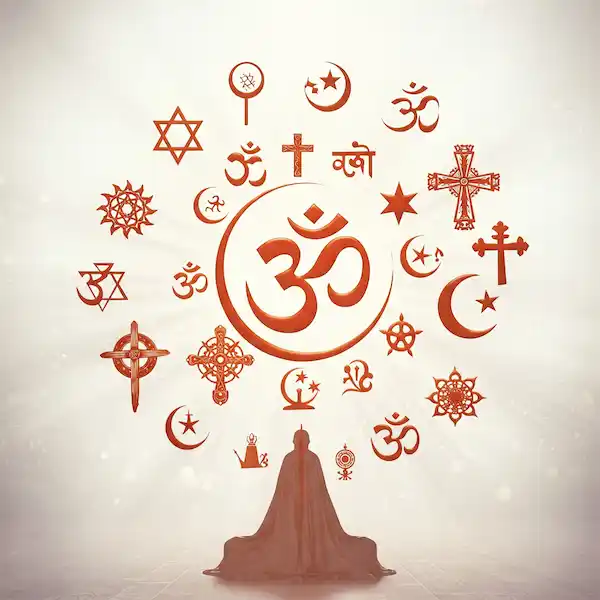The World’s Religions
The tapestry of human spirituality is woven with a rich diversity of religious traditions, each offering unique perspectives on existence, morality, and the divine. While sharing common threads like the pursuit of meaning and the establishment of ethical frameworks. The World’s religions diverge significantly in their core beliefs, practices, and interpretations of the sacred. Understanding these distinctions is crucial for fostering interfaith dialogue and appreciating the multifaceted nature of human belief.
Why do people affiliate with or believe their chosen religion?
It’s important to understand that the reasons behind religious affiliation are complex and multifaceted. Here’s a breakdown of the primary influences:
Family and Cultural Influence:
- Dominant Factor:
- For the vast majority of people, religious affiliation is heavily influenced by the family and cultural environment in which they are raised. Children typically adopt the beliefs and practices of their parents and communities.
- This transmission of faith across generations is a fundamental aspect of religious continuity.
- Cultural Identity:
- In many societies, religion is deeply intertwined with cultural identity. People may identify with a particular religion as a way of connecting with their heritage and community.
Personal Conviction and Spiritual Seeking:
- Individual Choice:
- While family and culture play a significant role, some individuals arrive at their religious beliefs through personal reflection, spiritual experiences, or intellectual inquiry.
- This can involve converting to a different religion or developing a unique spiritual perspective.
- Meaning and Purpose:
- Many people seek religion as a source of meaning, purpose, and guidance in their lives. They may find answers to existential questions and a sense of belonging within a religious community.
Social and Community Factors:
- Belonging:
- Religious communities provide a sense of belonging and social support. People may be drawn to a particular religion because of the strong social bonds and sense of community it offers.
- Social Norms:
- In some societies, religious affiliation may be influenced by social norms and expectations.
Coercion and Historical Context:
- Historical Influence:
- Throughout history, there have been instances where religion has been imposed through coercion or force. This is particularly true in historical contexts of conquest and religious persecution.
- Modern Context:
- While overt, violent, forced conversion is far less common in most of the world today than in the past, there are still areas where social pressures can be very strong.
- It is important to acknowledge that religious freedom is not universally upheld.
In summary:
- While personal conviction plays a role, the majority of people are members of their chosen religion due to the influence of their family and cultural background.
- It is a complex mixture of learned behavior, cultural identity, and personal searching for meaning.
Understanding the differences between world religions requires acknowledging the vast diversity of beliefs and practices that exist. Here’s a breakdown of some key distinctions:
Key Areas of Difference in the World’s Religions:
- Concept of Divinity:
- Monotheism: Belief in one God (e.g., Christianity, Islam, Judaism).
- Polytheism: Belief in multiple gods (e.g., some forms of Hinduism, ancient Greek and Roman religions).
- Non-theism: Absence of belief in a personal god or gods (e.g., some forms of Buddhism).
- Pantheism: The belief that God is everything and everywhere.
- Sacred Texts:
- Each religion often has its own set of sacred texts considered divinely inspired (e.g., the Bible, the Quran, the Torah, the Vedas).
- These texts provide moral guidance, historical narratives, and theological doctrines.
- Purpose of Life:
- Religions offer varying perspectives on the meaning and purpose of human existence.
- Some emphasize achieving salvation or enlightenment, while others focus on living a righteous life according to divine commandments.
- Afterlife:
- Beliefs about what happens after death differ significantly.
- Concepts include heaven, hell, reincarnation, and nirvana.
- Practices and Rituals:
- Religions have unique rituals, ceremonies, and practices, such as prayer, meditation, pilgrimage, and dietary restrictions.
- Ethical and Moral Codes:
- Religions provide frameworks for ethical behavior, guiding followers in their interactions with others.
Major World’s Religions and Their Differences:
- Christianity:
- Monotheistic, believing in one God in three persons (the Trinity).
- Central figure: Jesus Christ, believed to be the Son of God.
- Sacred text: The Bible.
- Islam:
- Monotheistic, believing in one God (Allah).
- Central figure: Prophet Muhammad, considered the last prophet.
- Sacred text: The Quran.
- Judaism:
- Monotheistic, believing in one God.
- Sacred text: The Torah.
- Emphasis on a covenant between God and the Jewish people.
- Hinduism:
- Diverse traditions, including polytheistic and monistic beliefs.
- Concepts: Karma, reincarnation, and dharma.
- Sacred texts: The Vedas, Upanishads, and Bhagavad Gita.
- Buddhism:
- Non-theistic or trans-theistic.
- Central figure: Siddhartha Gautama (the Buddha).
- Emphasis on achieving enlightenment (nirvana) through the Four Noble Truths and the Eightfold Path.
Key Differences of the World’s Religions Summarized:
- The nature of the divine, whether it’s one God, multiple gods, or no god.
- The role of prophets and religious leaders.
- The path to spiritual fulfillment.
- The understanding of the afterlife.
It’s important to approach the study of religions with respect and sensitivity, recognizing the profound significance they hold for their followers.
Frequently asked questions (FAQ) about the World’s Religions:
What are the major world’s religions?
The major world religions are Christianity, Islam, Hinduism, Buddhism, and Judaism. Other religions include Sikhism, Jainism, Baháʼí Faith, Taoism, Confucianism, and many more.
What are the key differences between the world’s religions?
Religions differ in their beliefs about God, the afterlife, sacred texts, rituals, and ethical practices. Some religions are monotheistic (believe in one God), while others are polytheistic (believe in many gods). Some believe in reincarnation, while others believe in heaven and hell.
What are the most common practices in each religion?
- Christianity: Prayer, attending church services, reading the Bible, and celebrating holidays like Christmas and Easter.
- Islam: Prayer five times a day, fasting during Ramadan, giving to charity, and making a pilgrimage to Mecca.
- Hinduism: Meditation, yoga, and celebrating festivals like Diwali and Holi.
- Buddhism: Meditation, mindfulness, and following the Eightfold Path.
- Judaism: Prayer, studying the Torah, observing Shabbat, and celebrating holidays like Hanukkah and Passover.
What are the core beliefs between the world’s religions?
- Christianity: Belief in God, Jesus Christ as the Son of God, and the Bible as the sacred text.
- Islam: Belief in one God (Allah), the Prophet Muhammad, and the Quran as the sacred text.
- Hinduism: Reincarnation, karma, dharma, and the goal of achieving moksha.
- Buddhism: The Four Noble Truths, the Eightfold Path, and the goal of achieving nirvana.
- Judaism: Belief in one God, the Torah as the sacred text, and the covenant between God and the Jewish people.
What are some of the challenges facing religious diversity today?
Challenges include religious intolerance, discrimination, and violence. These issues can be addressed through education, dialogue, and promoting understanding between different faiths.
All the World’s religions are primarily the same in their purpose and basic teachings
- They all teach their followers to be good people
- Belief in a high power that creates the teachings and provide rules for living
- The reward of doing good in their deity’s eyes, and the threat of doing poorly
- They all have their special holidays that celebrate important events in the history of their religion
- Each one has some form of extreme belief that is very different from the others
For information about the Christian faith called Mormons – Advice and Thoughts about the Mormon Religion

